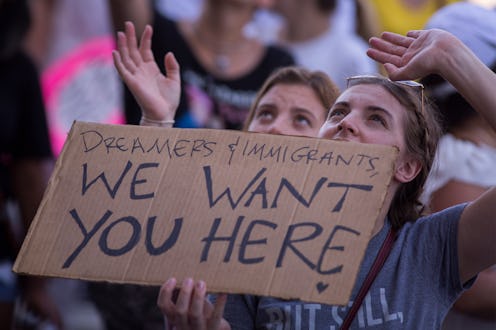News
Migrants' Claims About The Conditions Inside Some For-Profit Detention Centers Are Horrifying

As more information unfolds about the reported quality of living inside of migrant detention centers, human rights seem to be increasingly at stake. And an especially sobering question people are beginning to ask has to do with whether detention centers are for-profit or not. Although it seems like a strange idea at first, it's no different than the various for-profit jailing systems that exist in the country. And yes, many of these detention facilities are for-profit.
Take the Northwest Detention Center in Tacoma, Washington. According to CNN, this detention center is run by the GEO Group, which is the nation's largest private prison company. The GEO Group, CNN noted, has experienced a "financial boon" from Trump's aggressive zero-tolerance immigration policies. Put simply: the more detainees they get, the more money they make.
But it gets more convoluted than that. CNN reports that the GEO Group donated over half a million dollars to Trump's 2016 campaign. In contrast, the GEO Group argues that its facilities have consistently adhered to "performance-based standards set by the Federal government."
The ethical questions that are raised over the idea of for-profit detainment facilities are obvious, but beyond the dubious morality of having an incentive-based system for detaining migrants, there's also the reportedly poor conditions at the facilities to begin with.
In the Northwest Detention Facility, for example, CNN reports that there have been multiple hunger strikes in response to the supposedly inadequate food and apparent lack of medical care (the GEO Group insists that it's not responsible for medical care, and that this responsibility lies with ICE Health Service Corps). Pablo Paez, GEO group spokesperson, noted that its facility "provides culturally responsive, nutritious meals three times daily." In an emailed response to CNN, he said,
Our employees are proud of our record in managing the Tacoma ICE Processing Center with high-quality, culturally responsive services in a safe, secure, and humane environment. Members of our team strive to treat all of those entrusted to our care with compassion, dignity, and respect.
Commenting on the same reports, Carissa Cutrell, a spokeswoman for ICE, told CNN,
ICE takes very seriously the health, safety and welfare of those in our care. The agency is committed to ensuring that those in our custody reside in safe, secure, and humane environments and under appropriate conditions of confinement.
Yet other conditions include migrants supposedly being forced to work for a dollar a day, though the group claims the work is voluntary. In fact, Kevin Landy, former director of the Office of Policy and Planning at ICE, told NPR that detainee labor is a huge cost-reducer for the GEO Group.
"I believe contractors save a lot of money by using detainee labor because they're performing work [such as cooking and cleaning the facility] that would otherwise have to be performed by paid employees," Landy said to NPR in November 2017.
The same year, NPR noted that ICE, along with the U.S. Marshall Services, pays the GEO Group $32 million dollars a year to feed, house, and otherwise take care of detained migrants.
Currently, the GEO group is facing two lawsuits over reported labor-law violations in its detention facilities, both related to its dollar-a-day work program for the migrant detainees that it claims is voluntary. In 2017, the group defended itself against one of the lawsuits in an email to NPR:
GEO has consistently, strongly refuted the allegations made in this lawsuit, and we intend to continue to vigorously defend our company against these baseless claims. The volunteer work program at all immigration facilities as well as the minimum wage rates and standards associated with the program are set by the Federal government under mandated performance-based national detention standards. Our facilities, including the Aurora, Colo. Facility, are highly rated and provide high-quality services in safe, secure, and humane residential environments pursuant to the Federal Government's national standards.
In addition to the GEO Group, there are many other private companies as well as nonprofit groups that are reportedly earning millions of dollars to house migrant children, according to CBS News. If Trump's zero-tolerance policy continues then it follows that these companies will stand to profit significantly, especially if food and medical costs are kept low.